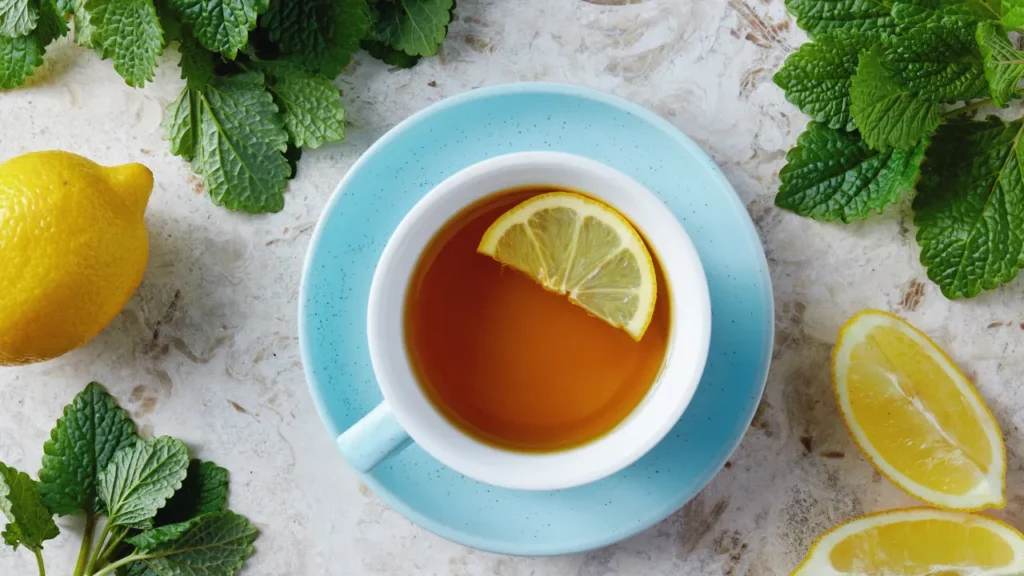The Lamiaceae family includes the perennial herb lemon balm (Melissa officinalis), which is indigenous to the Mediterranean region, North Africa, and Western Asia. Because of its relaxing and mood-lifting effects, it has a long history of usage in traditional medicine. For those looking to improve alertness, attention, and cognition, this article will explore the nature, health advantages, ideal dosage, side effects, potential drug interactions, and responsible usage of lemon balm as a nootropic supplement. Also, we will give a thorough summary of the chemistry of lemon balm and the physiological processes through which it acts on the body and the brain.
You May Also Like:
Should You Try CBD for Focus? Here Are the Facts.
Diamond CBD Gummies vs. Joy Organics CBD Gummies
Lemon Balm: Benefits, Dosage, Side Effects, Drug Interactions, And Other Important Information is an original (NootropicsPlanet) article.
Nature of Lemon Balm
Lemon balm is a fragrant herb distinguished by its little white blooms and lemon-scented leaves. Its bioactive substances, which include tannins, phenolic acids, terpenes, and flavonoids, provide a wide range of medicinal benefits. Triterpenoid acids, such as ursolic and oleanolic acids, are thought to be the main active components, along with rosmarinic acid.
Health Benefits of Lemon Balm
Researchers have examined lemon balm’s potential cognitive benefits and overall health advantages. Among the main advantages are:
- Cognitive Improvement: Studies have indicated that lemon balm enhances cognitive performance, notably in the areas of memory and concentration. Although the precise mode of action is still unknown, it is thought to include the regulation of neurotransmitters like acetylcholine and gamma-aminobutyric acid (GABA).
- Stress Reduction and Anxiety Relief: Lemon balm is well known for its relaxing and anxiolytic effects, which reduce anxiety and stress. It is thought to alter GABAergic neurotransmission, which is essential for controlling anxiety and stress.
- Better Sleep: Lemon balm’s ability to soothe and calm people may help them sleep better. It is frequently mixed with other herbs, including valerian root, to increase the benefits of encouraging sleep.
- Antioxidant and Anti-Inflammatory Properties: Lemon balm contains several antioxidant substances, such as flavonoids and phenolic acids, which help shield cells from oxidative stress and inflammation. These qualities may be attributed to its general health-promoting effects and potential neuroprotective advantages.

Chemistry of Lemon Balm
Lemon balm contains many bioactive substances, such as flavonoids, phenolic acids, terpenes, and tannins. Triterpenoid acids, such as ursolic and oleanolic acids, exhibit a variety of biological activities and are thought to be the principal active ingredients, together with rosmarinic acid, a phenolic acid with potent antioxidant and anti-inflammatory properties.
Physiological Mechanism of Action
Lemon balm’s unique chemical makeup and interactions with many cellular functions are responsible for its cognitive-improving and neuroprotective properties.
- Modulation of Neurotransmitters: Acetylcholine, an essential neurotransmitter for memory and learning, and gamma-aminobutyric acid (GABA), which is vital for controlling stress and anxiety, are just a few of the neurotransmitters that lemon balm may affect. The regulation of these neurotransmitters may be a factor in their anxiolytic and cognitive-improving effects.
- Antioxidant and Anti-Inflammatory Properties: Lemon balm contains several antioxidant substances, such as flavonoids and phenolic acids, that help shield cells from oxidative stress and inflammation. These qualities may be attributed to its general health-promoting effects and potential neuroprotective advantages.
- Acetylcholinesterase Inhibition: Lemon balm has been demonstrated to inhibit acetylcholinesterase, an enzyme that breaks down acetylcholine. By inhibiting this enzyme, lemon balm may support cognitive function by boosting acetylcholine levels in the brain.

Optimal Dosage of Lemon Balm
Many factors and the preparation used can affect the ideal dosage of lemon balm. For cognitive improvement and stress reduction, a daily dosage range of 300-900 mg of a standardized Lemon balm extract (containing at least 7% rosmarinic acid) is typically advised. It is essential to adhere to the instructions provided by the manufacturer for the particular product and seek specific advice from a healthcare provider.
Side Effects of Lemon Balm
There have been few recorded adverse effects of lemon balm, typically considered safe and well-tolerated. However, some people may experience moderate gastrointestinal discomfort, such as bloating or indigestion, particularly when first beginning supplementation. Applying lemon balm topically to sensitive people in rare instances may irritate their skin or trigger an allergic reaction. Always get medical advice before starting any new supplement regimen, particularly for people who have current medical concerns or are taking prescription drugs.
Potential Substance Interactions with Lemon Balm
While there is generally little chance that lemon balm may interact with other substances, care should be used when mixing it with drugs or supplements that have sedative or central nervous system depressive effects. These medications include benzodiazepines, barbiturates, and other sleep aids because the combination may increase their sedative effects. Lemon balm may also interfere with thyroid drugs since some research has found that it inhibits thyroid-stimulating hormone (TSH). Before taking Lemon balm as a supplement, anyone taking thyroid drugs should talk to their doctor.

Best Responsible Uses of Lemon Balm
Take into account the following recommendations to ensure the best responsible usage of lemon balm as a nootropic supplement:
- Quality and Purity: To guarantee consistent quantities of active components, choose a reliable source that offers high-quality, standardized lemon balm extracts. Choose items whose potency and purity have undergone independent testing.
- Begin with a Little Dosage: Start with a lesser dosage and increase it gradually to gauge each person’s tolerance and response. This strategy will enable a customized, efficient dosage while reducing adverse effects.
- Watch and Modify: Pay attention to how taking lemon balm supplements affects your body and thoughts. If you encounter any adverse effects or do not enjoy the anticipated cognitive advantages, reduce the dosage or consider stopping use.
- Speak with a Medical Professional: Before beginning any new supplement regimen, always seek medical advice, especially if you have current medical concerns or are taking prescription drugs.
Lemon Balm:
Conclusion
Lemon balm is a remarkable botanical with a wide array of potential health benefits. It is rooted in centuries of traditional use and culinary applications and supported by modern scientific research. Lemon balm offers a natural and holistic approach to promoting mental, emotional, and physical well-being. Its gentle yet effective nature and pleasant aroma and taste make it a versatile and accessible herbal remedy for addressing various health concerns. Incorporating lemon balm into one’s daily routine through teas, tinctures, or supplements can provide a natural and effective means to support mental, emotional, and physical wellness.

References:
- Melissa officinalis L. – A review of its traditional uses, phytochemistry, and pharmacology. Link: https://www.sciencedirect.com/science/article/abs/pii/S0378874116302732
- Effects of chronic administration of Melissa officinalis L. extract on anxiety-like reactivity and on circadian and exploratory activities in mice. Link: https://pubmed.ncbi.nlm.nih.gov/20171069/
- Anxiolytic effects of a combination of Melissa officinalis and Valeriana officinalis during laboratory-induced stress. Link: https://pubmed.ncbi.nlm.nih.gov/16444660/
- The role of essential oils in the treatment and management of attention deficit hyperactive disorder. Link: https://www.sciencedirect.com/science/article/abs/pii/S0962456201800357
- Effects of a Melissa officinalis special extract on mood and cognitive function. Link: https://www.thieme-connect.com/products/ejournals/abstract/10.1055/s-0035-1565353
Important Note: The information contained in this article is for general informational purposes only, and should not be construed as health or medical advice, nor is it intended to diagnose, prevent, treat, or cure any disease or health condition. Before embarking on any diet, fitness regimen, or program of nutritional supplementation, it is advisable to consult your healthcare professional in order to determine its safety and probable efficacy in terms of your individual state of health.
Regarding Nutritional Supplements Or Other Non-Prescription Health Products: If any nutritional supplements or other non-prescription health products are mentioned in the foregoing article, any claims or statements made about them have not been evaluated by the U.S. Food and Drug Administration, and such nutritional supplements or other health products are not intended to diagnose, treat, cure, or prevent any disease.


